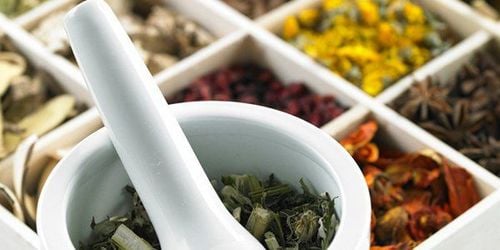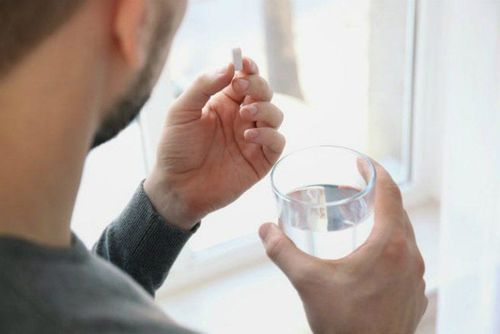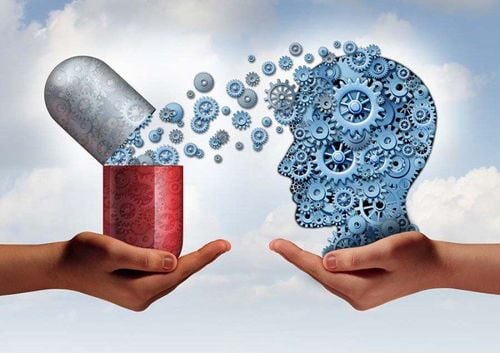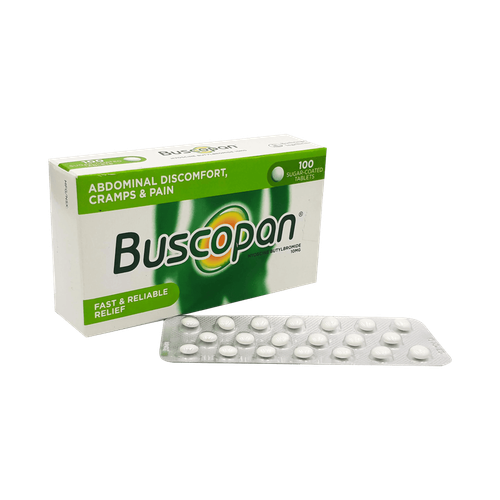This is an automatically translated article.
Irritable bowel syndrome is a functional disorder of the colon commonly seen in clinical practice, manifested through symptoms such as abdominal pain, abdominal distension, constipation alternating with diarrhea,... Currently, because of its nature, Because of higher safety, more and more patients are choosing methods of treating irritable bowel syndrome with Oriental medicine.
1. Irritable Bowel Syndrome Based on Modern Medicine
1.1. Definition Irritable bowel syndrome (IBS) or spastic colon syndrome is a functional disorder of the gastrointestinal tract, most commonly in the colon (large intestine). This syndrome is characterized by symptoms such as abdominal pain, distention, diarrhea alternating with prolapse, and changes in bowel habits without any physical involvement or anatomical changes in the body. intestinal tract.
1.2. Epidemiology Irritable Bowel Syndrome is common in young and middle-aged adults from 30 to 40 years of age and decreases after the age of 50. Some statistical reports show that irritable bowel syndrome is common in about 10 - 40 years. 22% of the population, and at the same time account for about 25-50% of outpatients with the rate of women being 2 times more than men. People in urban areas, with high levels of education, cadres and students have higher rates of disease than people in rural areas, farmers, and workers.
1.3. Causes Psychological problems: Anxiety, thinking too much, sleep disorders, depression, anxiety disorders, ... are factors that promote the formation of irritable bowel syndrome. Diet: Improper diet, eating foods of unknown origin, toxic, ... are common causes of digestive disorders, including irritable bowel syndrome. Other causes: The patient has had intestinal diseases, genetic factors in the family, hormonal changes in the menstrual cycle or using drugs that affect the endocrine system, etc. causes of abnormal bowel movements. 1.4. Diagnosis of Irritable Bowel Syndrome Clinical: Rome IV Criteria (2016): Irritable bowel syndrome is characterized by recurrent abdominal pain, occurring at least 1 day per week for the past 3 months here, with a combination of two or more of the following:
Relating to defecation. Changes in stool shape during bowel movements. Change in the number of bowel movements. Subclinical:
Blood count is usually not abnormal. Stool test for parasites or occult blood. Abdominal ultrasound, abdominal magnetic resonance, abdominal computed tomography (CT-scan of the abdomen) looks for tumors or dislocated tissues or other lesions in the abdomen. Colonoscopy is an essential tool used to rule out other pathologies in the colon. Biopsy and histopathology to confirm the diagnosis of colonic lesions.
2. Irritable Bowel Syndrome According to Traditional Medicine
Irritable bowel syndrome according to Traditional Medicine currently does not have a specific disease name, but only based on the clinical manifestations of the disease, thereby inducting into the following ranges of symptoms: Phuc Thong, Cholera, Phuc Obstacle, Convenience.
2.1. Causes and pathogenesis according to Traditional Chinese Medicine The triggering factor of this condition is often due to an ataxia of the will, leading to the accumulation of qi, thereby causing the ability to descend and at the same time make the transmission of Pi Vi messed up. disorder, which prolongs the disease and often recurs. The result of this process leads to damage to the spleen and kidney, damage to the spleen and kidney, damage to the spleen, weakness of the spleen, good luck, good fortune, convenient secret, and euthanasia. In addition, other causes such as psychological confusion, anxiety due to illness, unstable thoughts or irregular or improper diet can also lead to Cholera.
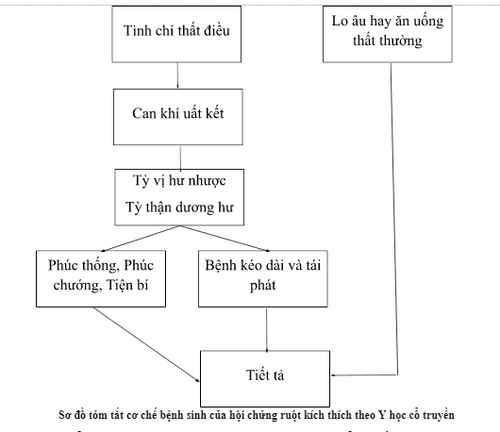
Sơ đồ tóm tắt cơ chế bệnh sinh của hội chứng ruột kích thích theo Y học cổ truyền
2.2. Diagnosis of Irritable Bowel Syndrome according to Traditional Medicine. Eight Diamonds: According to each disease. Tibetan cover: Pi, taste, can, kidney. 2.3. Methods to support the treatment and prevention of irritable bowel syndrome Avoid anxiety, thinking, stress or stress. Applying psychotherapy and relaxation helps to avoid excessive anxiety. Practice yoga, practice yoga regularly and properly. Drink lots of water every day. Eat regularly and on time. Diet: Avoid foods that cause gas such as carbonated drinks, cabbage, broccoli, cauliflower, raw fruit. Avoid foods containing Gluten such as wheat, barley, rye... Avoid FODMAPs containing fermentable sugars such as fructan, lactose or fructose,... 2.4. Treating Irritable Bowel Syndrome with Oriental Medicine Currently, treating irritable bowel syndrome with male medicine will be applied depending on different disease types. However, the main treatment method is still to regulate the function of spleen and stomach, only describe if there is loose stool, only gas, and convenient laxative if the bowel is constipated.
Treatment of Stomach Weakness:
Common symptoms due to Stomach weakness Loose stools, sometimes with raw stools, the amount of mucus and the number of bowel movements increases when eating fatty foods. Tongue is flat, thin white moss appears. People who are thin, eat poorly, are tired. Legal treatment: Nurturing flavor, suing Pi, only wasting waste. Remedy: The Four Kings Reduce, including Bach Truc 12g, Party Ginseng 12g, Bach Linh 12g, Injecting licorice 6g, Bach Bien beans 16g, Hoai Son 16g, Italy 16g, Divine Mercy 16g, Lien humiliation 12g , Malt 16g, drink 15-20g/time divided 3 times/day, drink with apple juice or warm water. Treatment of discordant spleen:
Common symptoms due to discordance of spleen and stomach Fullness of chest and ribs, digestive disorders, poor appetite, abdominal pain, abdominal bloating or loose and broken stools when angry or worried . suspense Bi-pink substance, with thin white moss. Mystic circuit. Legal treatment: Sue only describes, Can handle gas. Remedy: Weakness and strength reduction, including Bach Truc 12g, Tran skin 6g, Phong Phong 12g, Moc Huong 6g, Sai Ho 6g, Body only 12g, Licorice 6g, Incense supplement 10g, take 1 dose per day. Treatment of spleen and kidney failure:
Common symptoms caused by kidney failure. Undigested food, loose stools. The feeling of having a bowel movement and feeling more comfortable after defecation. When abdominal pain increases when experiencing cold or disease is easy to appear after eating cold raw food. Cold limbs and sore back and knees. Substance pale, with thin white moss. Delicate pulse. Legal treatment: Try waxing only the description, Take care of the spleen and kidney Remedy: Auxiliary Ly Trung Trung combined with the Four Gods Royal Family reduced, including Father Tu 10g, Can Khuong 10g, Nutmeg 10g, Ngu Tu Tu 6g, Bach Truc 12g, 6g corn, 100g big apple, 10g maple room, 6g licorice injection, 15g broken co chi, powdered to complete and drink 16-20g per day. Other methods:
Guava leaves: Method 1: 20g guava bud, 20g mangosteen peel, 20g roasted rice, 10g sharp roasted ginger, drink water several times a day. Method 2: Guava buds 20g, lemongrass 16g, galangal root 8g. Chop it into small pieces and then take it with water to drink during the day. Method 3: 20g guava buds, 10g dried tangerine peel, 10g cooked roasted ginger. Then cut into small pieces and decoction with 400ml of warm water and drink 2 times a day. Galangal root: Method 1: Root and skin of galangal root 50g, dried ginger 6g, boil thoroughly to get water and drink 2 times a day. Method 2: 20g galangal root, 20g sharp guava leaves to drink water instead of daily filtered water. Banana flower: Method 1: The sharp banana flower takes water, cools, when drinking, it can be mixed with 1 cup of white wine. Method 2: Banana flower 10g, rice 30g, cooked with 1 pig's heart and divided to eat for 10 consecutive days. Yellow comb: How to use: Chew raw yellow comb leaves before meals divided 3 times a day or you can cut the leaves into a glass jar with 1 liter of boiling water soaked for 12 hours, divided and drink several times a day. Massage, acupressure: Helps reduce nervous tension, improve some symptoms caused by irritable bowel syndrome. Acupuncture: Helps increase blood circulation, and helps regulate bowel movements, or spasms in the colon. The methods of treating irritable bowel syndrome according to traditional medicine are usually simple, cheap, and easy to do at home. However, the effectiveness of these methods is often not high and is often considered as a supportive treatment, not a radical treatment. Therefore, at present, some methods of using Eastern and Western medicine in combination often bring better treatment results for patients.




